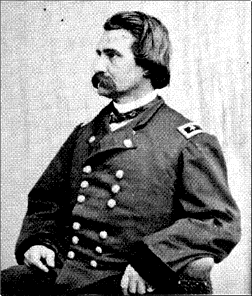I’ve complained many times that American history textbooks – especially for middle school children – have become nothing more than shallow, non-contextualized rants against America’s values, highlighting the very real sins of our past at the expense of conceptualizing our national “story.” And while giving some leeway to these same textbook authors due to omissions in the past, I’ve stated that by ignoring or trivializing vast swaths of American history, we’ve raised a generation of children who have no sense of a national narrative.
In Russia, they have exactly the opposite problem:
Russians remember the Siege of Leningrad—a brutal, 872-day blockade of Russia’s second-largest city by Nazi troops that killed 1.7 million people—as a dark, crucial moment in their history. Yet one of the most popular history textbooks in Russian classrooms casually distills the event into a mere four words.
“German troops blockaded Leningrad.”
Glaring omissions abound in Nikita Zagladin’s textbook, “History of Russia and the World in the 20th Century.” The Holocaust is never mentioned. The book barely acknowledges the Gulag labor camps.
And it flits past Russia’s 10-year conflict with separatists in Chechnya, reducing a pivotal episode in modern Russian history to seven paragraphs.
For some Russian academics, Zagladin’s penchant for smoothing over the bumps in Russian history is precisely the reason his textbooks have become mainstays in Russian classrooms.
Clearly, the Russians wish to create a national narrative without the inconvenient and embarrassing episodes that reflect badly on the overarching themes they’re trying to teach. But why?
When President Vladimir Putin met with historians at the Russian State Library in late 2003, he stressed that history textbooks should “cultivate in young people a feeling of pride for one’s history and one’s country.”
At the time, one of the most widely used history texts was Igor Dolutsky’s “National History: 20th Century.” For years, the book had been favored by teachers for its upfront discussion of sensitive topics, including Stalin’s purges, Chechnya and anti-Semitism in Russia.
“They said my book was `blackening’ Russian history,” Dolutsky said during a recent interview. “It was the first prohibition of a textbook in schools in 25 years.”
“Basically, they were dissatisfied with chapters devoted to Stalin’s regime and Putin’s leadership,” said Dolutsky, 51. “Sections that dealt with [Nikita] Khrushchev and [Mikhail] Gorbachev, they ignored.”
Trying to cover up the sins of Stalin’s murderous regime in which at least 20 million and perhaps as many as 40 million human beings were slaughtered is unconscionable. Not only is it dishonest, it leaves a gaping hole in modern Russian history. How can one explain Khrushchev without talking about Stalin’s ghastly regime?
This is what would happen in America if, say we wiped our history books of slavery or Native American genocide. Our modern history would make no sense. How did we get here from there?
Author Zagladin’s view of history in the classroom differs radically from Dolutsky’s. He agrees with Putin—a history textbook should make a pupil feel proud about Russia. It shouldn’t depress, and it shouldn’t shame.
“If a young person finishes school and feels everything that happened in this country was bad, he’ll get ready to emigrate,” Zagladin said during a recent phone interview. “A textbook should provide a patriotic education.
“It’s necessary to show Russian youths,” Zagladin continued, “that industrial development during the Stalin era was successful, and that the repressions and terror during that era did not touch all of the population.”
I’m very happy to learn that Stalin made the trains run – if not on time at least there were more of them to be late – but again, it’s hardly the point. And to be afraid the students will feel so much shame that they’ll leave the country is a novel excuse for cleansing textbooks of non-patriotic or embarrassing material. It assumes that students patriotism is shallow indeed.
Zagladin’s critics say Russian students do not need to be shamed, merely enlightened about history’s darker chapters, especially in a country where the truth has been lacquered over for so many years.
“According to polls, the majority of the population still considers Stalin to have played a positive role in Russian history,” said Yuri Samodurov, director of the Andrei Sakharov Museum. “And the problem here is, our schools don’t do anything to change this attitude.”
Where the Russians have a problem with selective scholarship about its sins, American textbooks (written by committee rather than by individual historians for the most part) give short shrift to national heroes like Washington and Jefferson in order to illuminate America’s “diversity.” This is a result of textbook publishers wishing to sell to as many markets as possible, yielding to multiculturalists (and the religious right in some cases) so that their products are as attractive to a school district in Nebraska as they would be in New York City.
Both approaches are wrong.
American history isn’t locked away in some closet being guarded 24 hours a day by CIA agents. The information is out there for anyone wishing to find it. I remember the brouhaha that erupted following the release of Stephen Spielberg’s excellent movie “Amistad” that told the story of slaves being shipped from the Caribbean to America who staged a mutiny aboard the vessel carrying them here (The Amistad), and the subsequent pleas made on their behalf by abolitionists that resulted in a Supreme Court decision granting them their freedom. Educators were outraged that this “fact” was kept from our school children because it wasn’t in any history textbooks. This is laughable. What isn’t in American history textbooks could fill a building the size of the Library of Congress.
The purpose of a textbook isn’t to “celebrate diversity” or keep students from emigrating. The purpose should be to make students hungry to learn more, to develop their minds by engaging in a little independent thought, or at the very least, to give students a basic idea of how we got here from there.
If Santayana is right – if “Those who do not learn from history are doomed to repeat it” – both the Russians and Americans are in for some very bad times in the future.
UPDATE
Two interesting takes from opposite sides of the Shadow Media.
From Rob’s Blog:
This is not the example we want to follow. It would be like us censoring out the “bad parts” of our history and then making heroes of people like the Ku Klux Klan, George Wallace, and those who furthered the institution of slavery (and later the practices of discrimination).
While Bush rubs elbows with his chum Mr. Putin, he would discourage this tendancy if he understood the implications himself. I doubt he really cares, though…the idea of complacent citizens who believe whatever the government spews out is probably to his liking, too.
While making a good point about heroes, I doubt whether the President would take it upon himself to lecture Putin about history textbooks. And how we got from Russian textbooks to eeeeeevil Bush wanting to turn the country into a bunch of spoon fed automatons is, well, a crock. If Mr. Rob has a scintilla of evidence to back up that statement (rather than his own outrageously ignorant bias) I’d like to see it.
And here’s a different kind of myopia from No Speed Bumps:
I don’t see any good coming out of grossly whitewashing your history, especially when you are overlooking one of the most prolific mass murderers in history. The Russians could find plenty of heroics to celebrate in their history, in spite of the relentless oppression they have faced throughout their history, without glossing over the hard parts. I know that the Russians are made of tougher stuff than that. In fact, I would think that they would want to know their real history. Some leadership is called for here: Putin get your head out of the sand.
Putin is leading – he’s leading the charge on this whitewash job because he senses that by resurrecting Stalin, his own plans for returning Russia to outright authoritarian rule will get a boost from historical precedent. So while I agree with the assessment that the Russians can take a little truth about their past, the point, unfortunately, is that Putin can’t.
Cross Posted at Blogger News Network

























